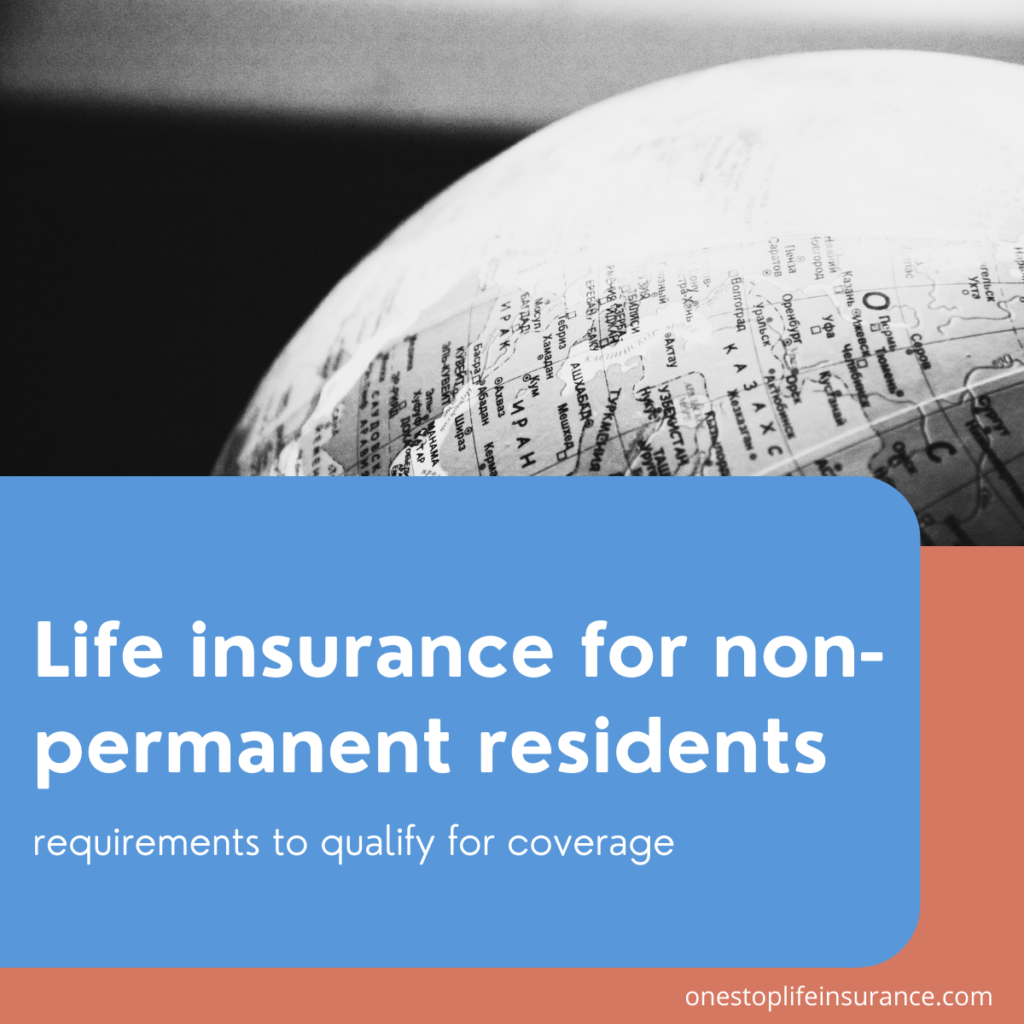Life insurance for non-permanent residents
It is not news that a large number of the population is foreign-born. In fact, approximately 13.3 % of the current population is born outside of the US and this number is continually growing. Therefore, we felt the need to discuss what are the options for life insurance for non-permanent residents.
In this guide, we would like to provide non-citizens with information on how to protect their families through life insurance. Our goal is to make sure you understand your options and what would be the next steps in the process.
We would like to start this article by saying that you do not have to be a US citizen to secure life insurance.
This will be a good time to mention that securing life insurance for non-permanent U.S. residents is a constantly changing topic. Please contact us to get the most up-to-date information on requirements and eligibility.

What we will cover:
- Who is considered a non-permanent resident
- Why life insurance for non-permanent residents may be a good fit
- Requirements for a non-permanent resident to qualify for life insurance in the U.S.
First off, we will define the difference between a permanent and a non-permanent resident. Afterward, we will answer the question of why a foreign national may consider purchasing a life insurance policy in the US, and then we will go over some of the basic requirements.
Who is considered a non-permanent resident
According to the USCIS definition, “a Green Card holder (permanent resident) is someone who has the authorization to live and work in the United States on a permanent basis. As proof of that status, a person is granted a permanent resident card, commonly called a “Green Card.”
On the other hand, a non-permanent resident is someone who is in the United States based on a visa. He or she is not considered an immigrant and is expected to leave the country upon the expiration of the visa. Some of the most popular examples of temporary visas are B-2 (visitor for tourism), E-2 (investor), F-1 (academic or language student), H-1B (specialty worker) and etc.
Typically, a visa allows a person to enter the U.S. and engage in certain activities while in the country. For example, if you receive a student visa, you can study in the United States – but in most cases, you can’t work off-campus and stay permanently (if this applies to you, check out our life insurance for international students guide).
For insurance purposes, the foreign risk profile generally falls into one or more of the following categories:
- Citizens of a foreign country who reside in the United States
- Individuals residing in a country other than the United States (visa holders, undocumented immigrants, DACA recipients and etc)
- Individuals who travel outside the United States (even expats will fall into this category)
There are many factors that could play a major role in determining underwriting eligibility. For example, the length of time spent in the US, your immigration status, past, and future travel plans, and any counties you may plan to visit. In order to get the best possible rate, you need a comprehensive review of your situation by an experienced agent.
Why life insurance for non-permanent residents may be a good fit
There are many reasons why a foreign national may purchase a U.S.-based life insurance policy. Here are just a few:
- Protect his family while in the United States.
- Ensure there will be funds to cover final arraignments and any other expenses
- The option to select U.S. beneficiaries (the beneficiaries need to have an insurable interest)
- Capacity—often there is a limited capacity in their own country
- The US dollar is still considered one of the leading currencies in the world
- They may be the concerned about the political and economic situation in their own country
- Protect U.S. assets such as homes, and businesses, or as a part of an estate planning strategy
- Would like to expand their portfolio and are accustomed to having investments offshore or based in the US.
Requirements for a non-permanent resident to qualify for life insurance in the US
An underwriting team of any given company has a list of requirements in order for an applicant to secure a life insurance policy. An example of these could be health status, qualify for a coverage amount, length of policy, type of policy and etc. On top of that, a non-resident must meet an additional set of criteria in order to obtain a policy. We will go over some of them, but could not get in-depth of all possible situations. You can always send us a quick e-mail with your particular circumstances.
Be present in the US
A non-resident wanting to get coverage must be in the country for the entire process. Finalizing a life insurance application typically takes 4-6 weeks. An applicant must be present in the United States for the following steps:
Solicitation – the quote and policy selection
Application – part of the process may be obtaining a copy of medical records from your country of origin. Please have all of your doctor’s contact information available. In some instances, you may bring your records, translated into English, but not in all cases.
Exam – needs to be completed in the US
Delivery of the policy – the policy needs to be mailed to a US-based address; P.O. Boxes are not acceptable
Set up a payment plan in a US currency – typically companies will draft payments out of a US bank account.
If someone other than the insured owns the policy, the insurable interest laws of the state of application and issue apply.
Have ties to the country
In order for a non-permanent resident to purchase a life insurance policy, he or she needs to have substantial ties to the county. An individual can’t come to the United States with the sole purpose of getting life insurance.
An example of ties to the country could be:
- Being married to a US citizen;
- Have an immediate family member, living in US and travel regularly to visit them. Examples of immediate family members include spouse, children, brother or sister;
- Have a bank account in the US;
- Own real property in the US;
- Be an employee of a US-based company;
- Maintain an investment interest in the US which may include investment account ownership in the U.S.;
- Have significant, systematic ongoing business activities in the US and etc.
Country of origin
When applying for life insurance, the underwriters take into consideration the country of origin. There are countries not allowing their citizens to purchase life insurance in the U.S. These counties are:
Argentina Panama
Belgium Poland
France Switzerland
Greece Uruguay
Japan Venezuela
We are not able to offer coverage for residents of the following countries:
| Cuba | Democratic Republic of Congo | Iran |
| Iraq | Lebanon | Liberia |
| Libya | North Korea | Somalia |
| Sudan | Syria | Zimbabwe |
The conditions in the world change very fast. Therefore, these lists of countries could also change. As of today, individuals residing in countries or jurisdictions under a current U.S. State Department Travel Warning will be individually considered and may be declined.
Please contact us with your specific situation for a personalized quote. In some cases, navigating through the world of insurance can be challenging and often confusing. We are here to help and guide you through the process. Life insurance for non-permanent US residents is possible and affordable, with the right tools and the advice of a licensed insurance professional.

1 Comment
Delia Foley
Would the parents of an international student studying at a United States university be eligible for a life insurance
policy? The parents live in Brazil, and the university would be the beneficiary of the policy (under the condition that
the student is still attending there at time of parents' death. Otherwise, could the student or other family member be the beneficiary)?
I am a life insurance agent. in Orlando, FL and I have relationships with foreign students.
Delia Foley